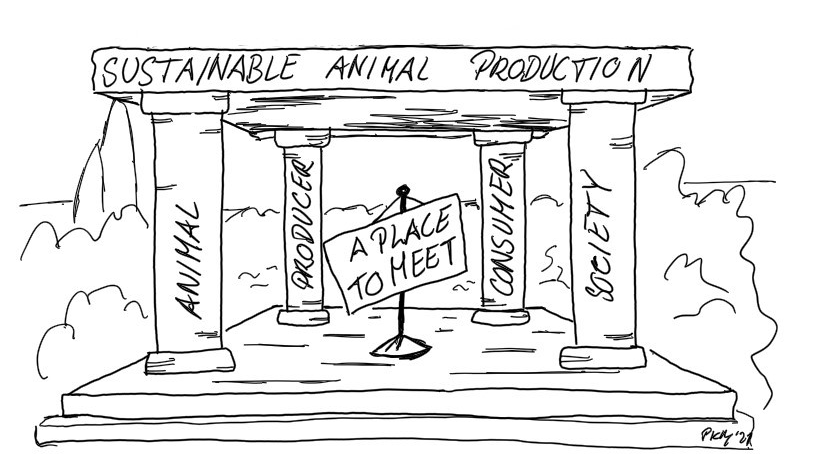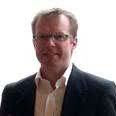Scenarios for Sustainable Animal Production in the Future
Scenarios for Sustainable Animal Production in the Future is a network across University of Copenhagen designed to explore ways to lessen the climate and environmental footprint of animal production. By working interdisciplinarily, the network will enable a joint exploration of the challenges in animal production, and facilitate a survey on how production systems and consumption may be moved onto more sustainable paths.
The goal of the network is to contribute to lessening the climate and environmental footprint of animal production. By working interdisciplinarily, the network will enable a joint exploration of the challenges with animal production, what meat and animal products should be in the future, and how production systems and consumption may be moved onto more sustainable paths.
“We build on history and design the future for animal production in Denmark”, says project leader Peter Karlskov-Mortensen.
The disciplines included in this network are animal and veterinary sciences, food sciences, environmental sciences, sociology, economy, anthropology and ethnology. In order to contribute to the sustainability agenda, this network will combine these disciplines in a fruitful way.
All too often, lessening the climate impact of animal production has been seen as something supposed to happen in one domain. E.g., either natural science fixed things like GHG emissions, or consumers lessened the demand for meat. However, neither of these solutions can stand alone. Bridges must be built between disciplinary initiatives to ensure they are complementary and not competitive, and the potential of truly interdisciplinary solutions must be explored and exploited.
In consequence, this network will organize activities that draw in all contributing disciplines, each responding from their perspective to the two overall goals:
1) To enable an interdisciplinary discussion about the environmental impact of production of beef, pork, chicken and dairy products
2) To identify what is needed – in terms of technologies, economy, product quality, and societal values – for a future climate neutral animal production.
The four pillars
The network will create a place to meet among four research areas - four pillars - upon which sustainable animal production must be based. One pillar discerns sustainability from the animal perspective - efficient use of resources, performance, health, welfare, biodiversity, feed and emission. Another pillar focuses on the producer in relation to sustainability - the production system, practices and the product. A third pillar perceives sustainability from a consumer point of view - needs and demands for products from farmed animals. A fourth pillar explores sustainability and animal production from a societal and cultural perspective - the past, present and future relations between people and animals in order to understand the recent rapid changes and potentials for future changes. Between these pillars, we will create a space for constructive dialogue, which can assure that future sustainable animal production will rest firmly on all four pillars.

A line of seminars will lead up to two major workshops, followed by research design workshops, which will produce specific research project layouts. The network will continue with consortium building, detailed project design and writing of grant applications.
Seminars
In the spring of 2022, we will arrange seminars for researchers and students at UCPH. The seminars will especially encourage students to contribute with innovative perspectives, ideas and solutions and inspire them to contribute. The seminars will serve as an inspiration for the following workshops.
This seminar took place 22. April 2022. See more about this seminar here
Ivory Tower Workshop 1
Two Ivory Tower Workshops will be held during the fall of 2022. They will be based on the four pillars on which a future for sustainable animal production must be based (see Background). The purpose of the first Ivory Tower Workshop is to let representatives from each of the four pillars present and explain what sustainability challenges look like from their own “ivory tower”. The workshop will make the audience face new challenges and see well-known challenges from new angles. Furthermore, the workshop will facilitate questions and answers, which will support an interdisciplinary understanding.
The workshop will be open to all. Invited researchers will represent each of the four pillars and the audience will constitute a common meeting ground. Pillar-specific presentations will be followed by circle-discussion in the audience. Subsequently, presenters and the audience can ask questions to each other. The purpose of the workshop is not to dispute but to understand how other scholars perceive the sustainability challenges in animal production.
Ivory Tower Workshop 2
As Ivory Tower Workshop 1 focuses on challenges, Ivory Tower Workshop 2 will focus on solutions to climate related challenges seen from the different pillars. Besides the change in focus, the overall format and organization of the workshop will be the same as for Ivory Tower Workshop 1.
Project design meetings
The Ivory Tower Workshops will be followed up by a meeting in the end of 2022. In this meeting, which is open to all interested, we will identify overlaps, synergies and possible collaborations as they emerged in the Ivory Tower workshops. The outcome is to (self-)organize interested participants into working groups that can meet in research design workshops.
Grant writing
The network will, upon request from the project groups, assist in project design and grant writing.
As the network expands its operations the output will be announced here.
Den 26 august 2025 afholdt det tværvidenskabelige forskningsprojekt; ”Cattle Crossroads. Researching Danish Livestock Production for the Future” afslutningskonferencen ”Det alternative husdyrbrug”, på Frederiksberg Campus. Læs mere om konferencen og se video af indlæggene.
Seminar: Exploring European-Chinese knowledge transfers in pig production, held on August 14th 2024, at University of Copenhagen on Frederiksberg Campus. Read more and see some videos from the seminar here.
On April the 22nd, the ”Scenarios for Sustainable Animal Production in the Future” network held its first seminar.
Read more about it here
The network for Sustainable Animal Production is made possible by a DKK 400,000 grant from the University of Copenhagen (UCPH). The network is a part of a UCPH 2023-Strategy project about green education, research, and society engagement.
The Steering Committee of Sustainability Science Centre and the Steering Committee for the 2023-project Green Education, Research and Society Engagement has chosen to support the Network for Scenarios for Sustainable Animal Production in the Future.
Network Organizing Committee
The Network for Sustainable Animal Production consists of researchers from a wide range of disciplines and departments at UCPH.
| Name | Title | Phone | |
|---|---|---|---|
| Search in Name | Search in Title | Search in Phone | |
| Adam Veng | Enrolled PhD Student | ||
| Arne Henningsen | Associate Professor | +4535332274 | |
| Carsten Nico Portefée Hjortsø | Associate Professor | +4535332287 | |
| Carsten Thure Kirkeby | Senior Researcher | +4535337215 | |
| Frida Hastrup | Professor | +4551298963 | |
| Johannes Gulmann Madsen | Associate Professor | +4535331040 | |
| Liza Rosenbaum Nielsen | Professor | +4535333015 | |
| Nathalia Brichet | Associate Professor | +4535337814 | |
| Peter Karlskov-Mortensen | Associate Professor | +4535333430 | |
| Rebecca Leigh Rutt | Associate Professor | +4535326984 |


